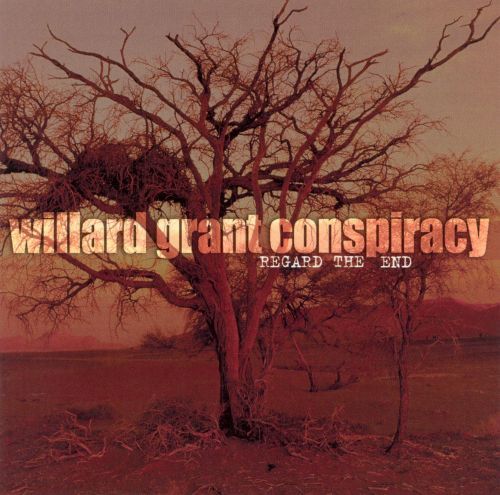If Grant Wood were to have been a musician instead of a painter, Regard the End would be a part of his discography. It smacks of Americana with its blend of folk, country, and blues. Instead the album belongs to Willard Grant Conspiracy. The core of the band was originally Robert Fisher and Paul Austin but this, their fifth album, finds Austin nearly out of the picture as he contributes to only two songs here. The bulk of Regard the End was penned by Fisher with the occasional contribution of a co-conspirator or the appropriation of a traditional song given the WGC treatment. In this case, it is applied by Fisher and 17 other musicians, including Austin. Far from being a hastily assembled group of sidemen, several of them have appeared on previous WGC albums or toured with the band. Part of the album was recorded in Slovenia so it should come as no surprise that there is a severe shortage of sprightly tunes here.
On the album’s dour cover is a near-barren landscape with a few scattered trees sans leaves. The inside of the CD tray features a photograph of an old house in the middle of winter covered with snow and frost. These images serve as preface to the music.
But as if to contradict this, the first song is almost a waltz. Lyrically, however, “River In the Pines,” reigns in any joy and replaces it with melancholy. It is a traditional song about the death of a Wisconsin boy while working on a river. His love, Mary, is so distraught over his death that she kills herself. The first half of the album is doleful with the penumbra of Josh Hillman’s violin hanging over them. “Ghost of the Girl in the Well” is a highlight. It tells the story of a teenage slave girl who falls down a well while fleeing from her owner who was looking to rape her once more. Kristin Hersh lends her vocal talents including a mournful wail.
Halfway through the album comes “Another Man Is Gone,” Fisher’s take on the traditional “Another Man Done Gone.” The song is sparse despite a bevy of instruments coming and going. A shrieking fiddle and piano vie for the listener’s attention while the low-key guitar and slide keep the song moving. At the crescendo, Fisher really lets loose and the result is spine-tingling. Tellingly, Fisher leaves out the verse: “He had a long chain on/He killed another man/I don't know where he's gone/I'm gonna walk your log.” Originally about a convict who escapes from a chain gang, Fisher prefers to downplay the story. Although the lyrics are in the third person, I get the impression that he’s singing about himself.
Fisher has a wonderfully rich baritone which is always centerstage. “Soft Hand,” which follows, seems antithetical. It begins with a drum loop and is followed with a catchy electric guitar riff. Reminiscent of The Tragically Hip, the track is woefully out of place. This is especially evident when the “Penny Lane”-like trumpet makes its entrance. Preceded by songs about a slave girl who falls to her death and the escape of a prisoner from a chain gang, lyrics such as “There I made you smile” sounds like a bitter joke.
But the album quickly returns to the more minimal and more subtle. “Fare Thee Well” is about the end of a relationship as the man lies on the bed in a rented room contemplating love lost and where to go next. Chris Eckman’s piano is understated but quite effective here. “Day Is Past and Gone”, at under two minutes, is too short but seems to offer a glimpse of sunlight with some uplifting mandolin by Simon Alpin.
The epic dirge “The Suffering Song” closes out the album. Nearly eight minutes long, it tells the tale of a family’s dissolution because of the death of the mother. Despite this, the narrator finds strength within himself to move forward: “I know there’s life beyond this ridge.” This seems to be the silver lining. Although the songs are soaked with sadness, they still find the characters finding some kind of hope. The narrator of “Fare Thee Well” tells us: “I look to the ceiling and find a reason/To carry on.” Mary may have committed suicide to escape pain, but she also joined her love in the grave.
Taking the out-of-place “Slow Hand” from the picture, Regard the End has a nice unified feel to it. Ensemble playing is prized above soloing giving Fisher’s voice a chance to really shine. If there is a gripe to be had, it is that Fisher rarely lets go. That the music is spare – almost minimalist in spots – is fine but its cue for the vocals to take up the slack is not picked up on. He seems content most of the time to let his vocals hang like a disembodied voice. Aside from his scream on “Another Man Is Gone” and a couple other spots, Fisher fails to get inside the songs. While not great, Regard the End is a good album for aficionados of roots music.
(This was originally published at The Green Man Review back in 2003-04.)

No comments:
Post a Comment